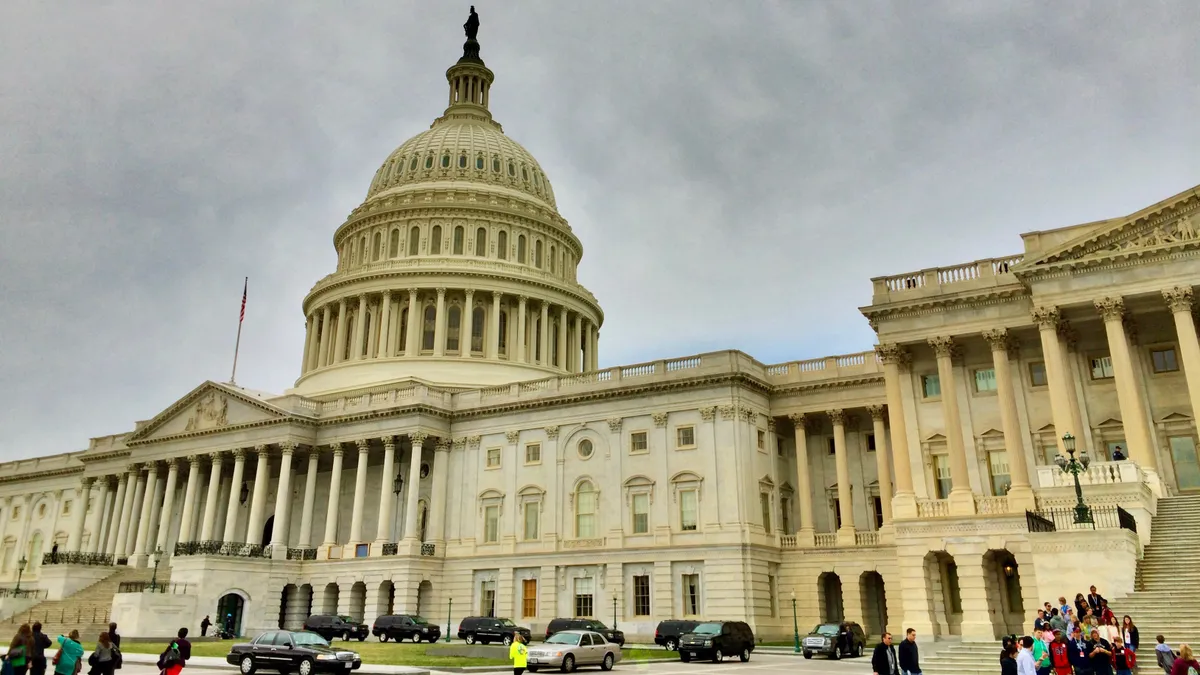Dive Brief:
- Recycling advocates and trade organizations are hopeful the next major federal stimulus package addressing impacts from the new coronavirus will include their sector. Some in the industry have said they are pushing lawmakers to include recycling in an infrastructure funding component as part of any so-called "phase four" effort.
- The National Waste and Recycling Association (NWRA) shared its five-point proposal for the stimulus with Waste Dive, which includes a call for "incentives for the private sector to increase domestic recycling infrastructure" and argues manufacturers need access to recycled materials in order to meet demand for "basic goods and emergency supplies."
- The Recycling Partnership (TRP) and others also propose $100 million be included in the next stimulus package to bolster recycling. "This investment will create thousands of jobs, ensure worker safety, as well as capture more value from recycled materials and deliver the raw recycled materials needed by our manufacturing supply chain," TRP Vice President Elizabeth Biser told Waste Dive in a statement.
Dive Insight:
The most recent $2.2 trillion stimulus package from Congress — or "phase three" — was viewed as having more implications for frontline workers and small to medium-sized companies than the wider industry. While NWRA and the Solid Waste Association of North America (SWANA) supported that stimulus, it was largely categorized by the industry as a first step rather than an all-encompassing solution.
Now, as Congress debates another potential round of aid, players in the recycling sector are ramping up their appeals for help. Prior to the onset of the pandemic, a number of recycling bills were gaining momentum at the federal level for the first time in decades. Now that the coronavirus has upended policymaking priorities for the foreseeable future, the industry is facing uncertain terrain.
Some bills in Congress backed by environmental groups — such as the Break Free From Plastic Pollution Act — failed to generate much support from companies and trade organizations who have argued against a "kitchen sink" approach in introducing regulations. But other bills have been praised as critical for an industry that has been in flux for several years due to the collapse of end markets and international policy moves. Those include the RECOVER Act, which targets infrastructure, and the RECYCLE Act, which centers on education and outreach.
While supporters of those bills are optimistic they may still see a vote, there is concern that any momentum has been somewhat deflated. Still, NWRA, SWANA and others are hopeful a solution could be found in the next phase of federal funding.
"SWANA strongly supports including funding to support recycling programs in the next phase of congressional stimulus efforts," said CEO and Executive Director David Biderman in an email to Waste Dive. He offered that the RECOVER Act, for example, could be incorporated into any stimulus effort. "We are in recent contact with the Hill about this," said Biderman.
Proponents of action also stress a need for speed. "Demand for recycled materials by the manufacturing supply chain is outstripping supply. This is more important than ever right now given that many of the products in short supply such as water bottles, toilet paper, and cardboard boxes use recycled materials," said Biser.
Commercial volumes are largely down at the moment, due to the shuttering of businesses, while residential volumes are growing. It is unclear what larger impact that volume shift is having on already-strained municipal recycling systems, but a number of areas have suspended or adjusted their programs. In some cases that has been done to free up workers and enforce public health guidance. But there could be larger impacts as those suspensions go on, especially for companies that rely on curbside collection as a major source of recycled feedstock.
"This material is central to the continuity of critical supply chains supporting the U.S. health system, as well as the broader circular economy," said Biser, who also argued federal investment in recycling would help accelerate economic recovery once the pandemic tapers off.
During a Wednesday webinar hosted by the Association of Plastic Recyclers (APR), speakers acknowledged the growing push to restart momentum around recycling legislation. Steve Alexander, APR president, said the group has again pushed Congress to pass the RECOVER act in light of the current crisis. He acknowledged, however, a stalemate between Republicans and Democrats in Washington could delay any final agreement.
Unless lawmakers decide to okay voting by unanimous consent, the earliest the legislature will be back in session is May 4. At that point, discussions over future aid packages are likely to dominate the session.










